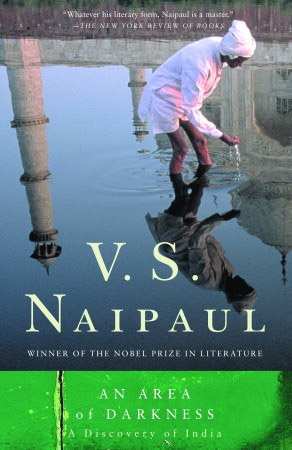
I took V.S. Naipaul to the lake with me. I sat in a lawn chair with my feet in the water. The August day was warm, but I had a cool bottle of water and some cherries, cold and hard from the cooler.
I wanted to relax, but my head was spinning. Naipaul writes with such contempt at times that I feel I might dislike him as a person, but as a writer –oh the depth of his thoughts and layering of personal/historical/analysis- I’m caught up in his mind and he’s running through my mind and it feels deep and personal and true. His contempt for others is woven with moments of tenderness and self-reflection “I am the monster, ” he says, and I agree “I am the monster.” And we are.
In ‘An Area of Darkness,’ there is no peace with India, but there is a respect. And I wouldn’t be surprised to discover that India felt the same about Naipaul. It was banned in India for it’s negative portrayal. His lists of sensory details and contextual layering make the reading of this book, slow. It’s cognitively rich, and prompts thoughts of my own complicated culture. In India, culture may prescribe ways of thinking and acting that are not questioned (and don’t we do the same things here?) despite the hurt and disorganization. Naipaul is so true and honest that he betrays himself by choosing no guard, and he reveals his own ugliness with his head held high. Why would he treat India better than himself?
After I finish the book, I wash off the cherry-red stains from my fingers–swirling them in the water as I wade in and dive under. India, he says, is not one thing, and neither is Naipaul. When I return home, the NY Times sends me an alert that Naipaul as died, an old man surrounded by family who loved and admired him (at least some of the time). My skin feels tight from the time in the sun. My hair carries the fragrance of the lake; my thoughts with the monsters of the loch. Goodbye V.S. Naipaul.

